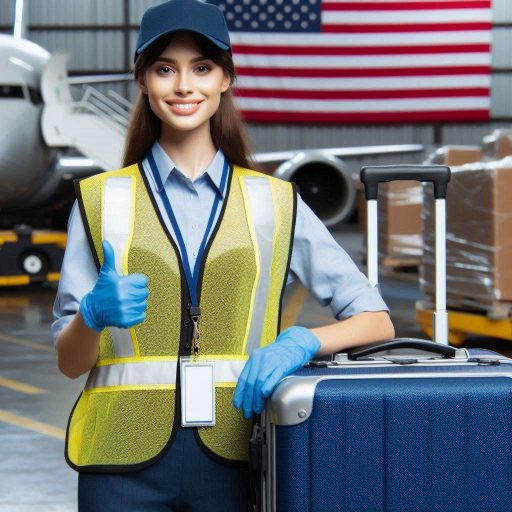Introduction
Baggage handlers play a crucial role in the travel industry, ensuring smooth airport operations.
Without them, the entire system would face delays, mishandled luggage, and dissatisfied travelers.
They manage the essential task of handling passengers’ bags, making sure every piece of luggage reaches the right destination.
These professionals work behind the scenes, but their impact is immense.
Baggage handlers are responsible for loading and unloading luggage from planes, trucks, and conveyor belts.
They also operate various equipment, like baggage carts, tugs, and belt loaders.
Their work ensures the swift movement of luggage from check-in to the aircraft and from the plane to the baggage claim area.
This role demands a combination of physical strength and stamina.
Baggage handlers must lift heavy bags, often exceeding 50 pounds.
They spend hours on their feet, moving quickly in a fast-paced environment.
The job can be physically taxing, especially during peak travel seasons, when the volume of passengers‘and luggage‘rises.
The harsh weather conditions, whether in extreme heat or cold, add another layer of difficulty to the role.
In addition to physical demands, baggage handlers need to be alert and detail-oriented.
Each piece of luggage must be sorted and loaded correctly to ensure it reaches its destination.
A misplaced or delayed bag can cause significant frustration for travelers.
Accuracy is crucial to avoid costly mistakes, and timing is everything.
Flights have tight schedules, so baggage handlers must work efficiently under pressure to meet deadlines.
Given the complexity and physical demands of this role, it is clear why specialized training programs are necessary.
Aspiring baggage handlers need to develop skills that go beyond raw strength.
They must learn proper lifting techniques to avoid injuries and improve efficiency.
Training programs focus on teaching safe handling practices, equipment operation, and airport safety protocols.
Overview of Baggage Handling
Baggage handling is a critical part of airport operations.
Baggage handlers manage the safe and timely transport of luggage.
Their responsibilities include loading, unloading, and sorting baggage.
They ensure that bags arrive at the correct destination.
Each task requires attention to detail and physical stamina.
Baggage handlers work in various environments, often under tight deadlines.
Responsibilities of Baggage Handlers at Airports and Other Travel Hubs
Baggage handlers have several key responsibilities.
They load and unload luggage from aircraft and transport it to the baggage claim area.
Handlers also sort bags based on flight destinations.
This sorting process ensures that each bag reaches the right aircraft.
They handle oversized and fragile items with extra care.
Additionally, baggage handlers perform routine equipment checks to maintain safety standards.
These responsibilities are vital for smooth airport operations.
Importance of Efficient Baggage Handling for Customer Satisfaction and Safety
Efficient baggage handling significantly impacts customer satisfaction.
Passengers expect their bags to arrive on time and in good condition.
Delays or lost luggage can lead to frustration and negative experiences.
When baggage handlers perform their duties well, they enhance the overall travel experience.
Satisfied customers are more likely to return and recommend the airline.
Thus, effective baggage handling is essential for maintaining a positive reputation.
Safety is another crucial aspect of baggage handling.
Handlers must adhere to strict safety protocols while performing their duties.
Mishandled baggage can lead to injuries or damage to property.
Proper training helps minimize risks and ensures a safe working environment.
Baggage handlers also manage the secure transport of items that require special care.
They handle fragile items and valuable cargo with extra caution.
Types of Baggage Handlers (Ramp Agent, Baggage Porter, etc.)
There are different types of baggage handlers, each with specific roles.
Ramp agents primarily work outside, handling luggage on the tarmac.
They load and unload bags from aircraft.
Their tasks often include operating machinery like tugs and belt loaders.
Ramp agents must be vigilant and work in various weather conditions.
Baggage porters, on the other hand, assist passengers directly.
They help travelers move their luggage to and from terminals.
Porters provide a personal touch to the travel experience.
Their assistance can ease the stress of navigating through busy airports.
Some airports employ baggage claim representatives.
These handlers work in the terminal, addressing passenger inquiries.
They assist travelers who encounter issues with their luggage.
Their role is essential for maintaining clear communication between the airline and its customers.
Additionally, some organizations use specialized baggage handling teams for international flights.
These teams handle customs and security checks for international luggage.
They ensure compliance with various regulations and requirements.
Overall, baggage handlers play a vital role in airport operations.
Their work ensures that passengers receive their luggage safely and efficiently.
As travel continues to grow, the demand for skilled baggage handlers will remain high.
Investing in training programs is essential for aspiring baggage handlers.
These programs equip them with the necessary skills for a successful career in the aviation industry.
Physical Requirements for Baggage Handlers
Physical Stamina and Strength Needed for the Job
Baggage handlers face a demanding job that requires physical stamina and strength.
These professionals lift, carry, and move heavy luggage daily.
Handling baggage can involve lifting items weighing up to 70 pounds.
This repetitive lifting can lead to fatigue, so physical fitness is crucial.
Regular exercise, focusing on strength training and cardiovascular endurance, is essential for success in this role.
Importance of Agility and Flexibility in Handling Luggage
Agility and flexibility play significant roles in baggage handling.
Workers must maneuver through tight spaces in airports and around moving vehicles.
Quick reflexes help handlers respond to unexpected situations, such as avoiding obstacles.
Flexibility allows them to reach awkward angles while lifting bags.
Stretching exercises can improve flexibility and help prevent injuries during work.
Need for Proper Technique to Prevent Injuries
Proper lifting techniques are vital for maintaining safety and efficiency.
Baggage handlers must learn how to lift correctly to avoid strain.
Instead of bending at the waist, they should bend at the knees.
This technique distributes weight evenly across the body.
Handlers should also keep their loads close to their bodies while lifting.
This practice minimizes stress on the back and reduces the risk of injury.
In addition to lifting, handlers must be prepared for various physical tasks.
They may need to push and pull heavy carts filled with luggage.
This requires strong upper body strength and endurance.
Additionally, workers must be able to walk long distances on airport tarmacs.
A typical shift may last several hours, with limited breaks.
Staying physically fit enables baggage handlers to meet these demands effectively.
Injuries are a common concern in this line of work.
Poor technique can lead to strains, sprains, and other injuries.
Therefore, training programs often include instruction on proper lifting and carrying methods.
Handlers should also learn to identify potential hazards in their environment.
Awareness can help them avoid accidents and protect themselves from injury.
Overall, the job of a baggage handler is physically intensive.
Those interested in this career must prioritize their physical fitness.
A strong foundation in strength, agility, and proper techniques can make a significant difference.
Aspiring baggage handlers should focus on developing these skills to excel in their roles.
By doing so, they can ensure their safety and efficiency while handling luggage.
This focus on physical requirements ultimately leads to a more successful career in baggage handling.
Read: Creating a Comfortable Atmosphere in Your Nail Salon
Types of Training Programs Available
When it comes to training programs for aspiring baggage handlers, there are several options available to suit different learning styles and preferences.
Below are the main types of training programs that individuals can consider:
Traditional Classroom-Based Programs
Traditional classroom-based training programs are often offered by vocational schools, community colleges, and aviation training centers.
These programs typically involve in-person lectures, group discussions, and hands-on exercises to provide students with a comprehensive understanding of the baggage handling process.
Students enrolled in traditional classroom-based programs can benefit from the expertise of experienced instructors who can offer personalized guidance and support throughout the training period.
Additionally, these programs often include practical simulations and on-the-job training opportunities to help students develop relevant skills and gain real-world experience in handling baggage safely and efficiently.
Online Training Programs
For individuals who prefer a more flexible and convenient learning environment, online training programs can be a great option.
These programs allow students to learn at their own pace and from the comfort of their own homes, making it easier to balance training with other commitments such as work or family responsibilities.
Online training programs for aspiring baggage handlers typically feature interactive modules, video tutorials, and quizzes to help students grasp key concepts and reinforce their learning.
While online programs may lack the hands-on practical experience offered in traditional classroom-based programs.
They can still provide valuable knowledge and skills that are essential for success in the field of baggage handling.
Hands-On Training Components
Regardless of the type of training program chosen, hands-on training components are crucial for developing the practical skills and competencies needed to excel as a baggage handler.
Hands-on training may involve activities such as loading and unloading baggage, operating baggage handling equipment, and following safety protocols and procedures.
Hands-on training components can be integrated into both traditional classroom-based programs.
Online training programs through the use of practical simulations, virtual reality technology, and on-the-job training opportunities.
By providing students with hands-on experience in a controlled environment, these training components help to bridge the gap between theory and practice.
Ensuring that aspiring baggage handlers are well-prepared to meet the demands of the job.
In a nutshell, aspiring baggage handlers have a range of training programs to choose from, each offering unique benefits and opportunities for learning and growth.
Whether opting for a traditional classroom-based program or an online training program.
Individuals can gain the knowledge, skills, and hands-on experience needed to succeed in this dynamic and rewarding field.
Read: How to Create a Pet-Friendly Grooming Environment

Curriculum of Training Programs
Training programs for aspiring baggage handlers cover essential skills and knowledge to excel in the field.
These programs include various modules designed to equip trainees with the necessary tools.
Each module focuses on a specific aspect of baggage handling, ensuring a comprehensive understanding of the job.
Detail the Modules Covered in Baggage Handler Training Programs
Baggage handler training consists of several modules that address key competencies.
These modules are structured to provide hands-on experience and theoretical knowledge.
Trainees engage in practical exercises and simulations to reinforce their learning.
The curriculum ensures that participants are job-ready upon completion.
Topics Such as Lifting Techniques, Safety Procedures, Baggage Screening, and Customer Service
Lifting Techniques
One of the first modules addresses lifting techniques.
Proper lifting is crucial to avoid injuries and maintain efficiency.
Trainees learn how to lift heavy bags safely, using their legs instead of their backs.
Instructors demonstrate proper posture and movements, emphasizing the importance of balance.
This training helps prevent workplace injuries, ensuring handlers can perform their duties without risk.
Safety Procedures
Safety is a top priority in baggage handling.
The safety procedures module educates trainees about potential hazards in the airport environment.
Participants learn about the importance of personal protective equipment (PPE) and its proper usage.
The program covers emergency response protocols and how to handle dangerous situations.
Understanding safety procedures protects workers and ensures smooth airport operations.
Baggage Screening
The baggage screening module trains handlers in identifying and managing security risks.
Trainees learn how to operate screening equipment and recognize suspicious items.
This knowledge is crucial for maintaining airport security and passenger safety.
Participants also learn to work closely with security personnel, ensuring effective communication during potential threats.
Customer Service
Customer service is another vital aspect of baggage handling.
The customer service module emphasizes the importance of effective communication and professionalism.
Trainees learn to assist passengers with inquiries and complaints, enhancing their travel experience.
This training fosters a positive atmosphere in the airport, promoting satisfaction among travelers.
Transform Your Career Today
Unlock a personalized career strategy that drives real results. Get tailored advice and a roadmap designed just for you.
Start NowCertifications or Licenses That May Be Required for the Job
Certain certifications may be required for baggage handlers.
Programs often include training for obtaining necessary licenses, such as those for operating forklifts or baggage handling equipment.
In some regions, handlers may also need security clearance, particularly when working in restricted areas.
Completing these certifications ensures that baggage handlers meet industry standards and regulatory requirements.
Read: Nail Technician Networking: Building Industry Connections
Duration and Cost of Training
The Typical Length of Baggage Handler Training Programs
Aspiring baggage handlers often wonder about the duration of training programs.
These programs typically range from a few days to several weeks.
Most training lasts about two to four weeks, depending on the institution.
Hands-on experience, classroom instruction, and safety training comprise the curriculum.
Each program includes practical exercises to ensure students are job-ready.
The Cost Associated with Enrolling in These Programs
The cost of training programs can vary significantly.
On average, students can expect to pay between $500 and $3,000.
This price often depends on the location and reputation of the training provider.
Some programs charge a flat fee, while others have variable costs based on hours of instruction.
Additionally, some airlines or airports may offer in-house training at no cost, which can greatly benefit aspiring baggage handlers.
Financial Aid or Scholarship Opportunities Available for Aspiring Baggage Handlers
It‘s crucial for prospective baggage handlers to explore financial aid options.
Many training institutions provide scholarships to support students.
Aspiring baggage handlers can apply for federal financial aid through the FAFSA.
Some organizations also offer grants or loans specifically for vocational training.
In addition to scholarships, some airlines sponsor training programs.
These programs may cover tuition and provide a job guarantee after completion.
Some airports also offer apprenticeships that include training and a stipend.
Such opportunities can significantly reduce the financial burden on students.
Students should research various training options before committing.
Comparing costs, program length, and financial aid opportunities is essential.
This research helps students find the best fit for their career goals and budget.
Considering the benefits of these programs, the investment in training can pay off.
Baggage handling can lead to stable employment and growth opportunities in the airline industry.
With dedication and training, aspiring baggage handlers can build successful careers.
While some may perceive the cost as high, many find it worthwhile.
Many entry-level positions offer competitive salaries and benefits.
Job security in the airline industry often offsets initial training costs.
Ultimately, aspiring baggage handlers should weigh their options carefully.
Understanding the duration and cost of training is vital for making informed decisions.
Thorough research can lead to finding a program that aligns with financial situations and career aspirations.
Taking the time to investigate various programs can pay dividends.
Whether through scholarships, financial aid, or airline sponsorships, aspiring baggage handlers have several avenues to explore.
With the right training, they can embark on a rewarding career in the aviation industry.
Read: The Role of Technology in Modern Pet Grooming
Gain More Insights: How Locksmiths Enhance Home Security Systems
Job Placement Assistance
How Training Programs Help Graduates Find Employment
Training programs for aspiring baggage handlers play a crucial role in securing employment for graduates.
These programs often include job placement assistance, ensuring graduates find suitable positions quickly.
They equip students with the skills needed to excel in the aviation industry.
Many programs provide resume workshops and interview preparation to help students present themselves confidently to potential employers.
Networking events also allow students to meet industry professionals and make valuable connections, significantly enhancing their job prospects.
Partnerships with Airlines, Airports, and Other Travel Companies
Many training programs develop partnerships with airlines, airports, and travel companies.
These connections provide students with direct access to job openings.
By collaborating with industry leaders, training programs stay updated on the latest hiring needs, increasing the chances of graduates landing interviews.
Additionally, internships often arise from these partnerships, allowing students to gain real-world experience and showcase their skills to potential employers.
Employers appreciate candidates who have completed comprehensive training programs, making graduates valuable assets from day one.
The Job Outlook and Potential Career Growth Opportunities for Baggage Handlers
The job outlook for baggage handlers remains promising.
According to the Bureau of Labor Statistics, the demand for baggage handlers is expected to grow due to increasing air travel and the need for efficient baggage handling.
As airports expand, more jobs will become available.
Career growth opportunities exist for those starting as baggage handlers.
With experience, individuals can advance to supervisory roles or management positions.
Many companies offer training for employees seeking to climb the career ladder, focusing on professional development and encouraging employees to stay and grow within the organization.
Ultimately, training programs serve as a vital bridge between education and employment.
They prepare students for the demands of the job while offering essential support in the job search.
By focusing on partnerships, practical experience, and career growth, these programs ensure their graduates succeed in the competitive aviation field.
In short, aspiring baggage handlers benefit significantly from job placement assistance offered by training programs.
With industry partnerships, hands-on experience, and opportunities for advancement, graduates are well-equipped to thrive.
The future looks bright for those entering this essential sector of the aviation industry.
Conclusion
Training Programs for Aspiring Baggage Handlers
Baggage handling is a crucial aspect of the aviation industry that requires specialized skills and knowledge.
Aspiring baggage handlers must undergo thorough training to ensure they can handle luggage efficiently and safely.
Training programs for baggage handlers typically cover a range of topics, including proper lifting techniques, aircraft safety protocols, and customer service skills.
These programs are designed to prepare individuals for the demands of the job.
Why is specialized training important?
Specialized training is essential for aspiring baggage handlers to perform their duties effectively and reduce the risk of injury.
Handling luggage requires physical strength and the ability to work under pressure.
Moreover, proper training ensures that baggage handlers understand the importance of following strict safety procedures to prevent accidents and damage to passengers’ belongings.
This level of knowledge and skill can only be acquired through comprehensive training programs.
Consider enrolling in a training program
If you are interested in pursuing a career as a baggage handler, enrolling in a training program is highly recommended.
These programs provide you with the necessary skills and knowledge to succeed in this demanding role.
By undergoing specialized training, you can enhance your chances of securing a job in the aviation industry and excel in your career as a baggage handler.
Investing in your education and skill development is crucial for long-term success in this field.
In the end, specialized training is vital for aspiring baggage handlers to excel in their field.
By enrolling in a training program, individuals can acquire the necessary skills and knowledge to thrive in this challenging role.
If you are considering a career as a baggage handler, investing in training is a wise decision that can set you up for success in the aviation industry.




